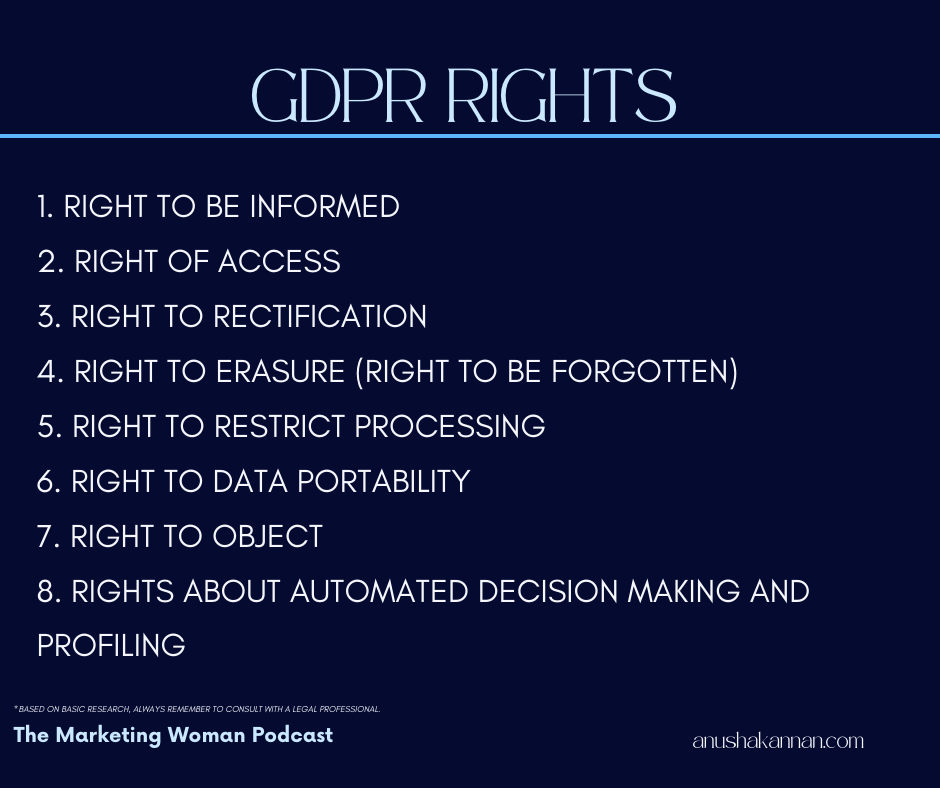What is Data Privacy in Marketing?
In the fast-evolving digital landscape, the importance of data privacy and ethics in marketing has never been more pronounced. As businesses and marketers, the responsibility to handle customer data with the utmost care and respect is a paramount concern.
Inspired by a recent episode of The Marketing Woman podcast (listen here), talks about the critical aspects of data privacy, the implications of regulations like GDPR and CCPA, and how marketers can navigate these complexities to foster trust and enhance customer relationships.
The Foundation of Trust: Understanding Data Privacy
Imagine browsing online for a new pair of shoes, adding items to your cart, and then noticing similar recommendations on other websites. Behind the scenes, your data is being collected to personalize your shopping experience. While this can be convenient, it also raises significant privacy concerns. Unauthorized access to personal data can lead to identity theft and other forms of cybercrime. Regulations such as the General Data Protection Regulation (GDPR) in the European Union and the California Consumer Privacy Act (CCPA) in the United States have been established to combat these risks. These laws serve as guardians of personal data, ensuring that businesses handle customer information with care and respect.
GDPR: A Global Standard for Data Protection
GDPR has set a global benchmark for data privacy, offering individuals more control over their personal data. It mandates that businesses obtain explicit consent before collecting data and inform individuals about how their data will be used. One of the regulation's cornerstone principles is the right to be forgotten, allowing individuals to request the deletion of their data.
CCPA: California's Answer to Data Privacy
While GDPR has a broader scope, CCPA focuses on providing privacy protections specifically for residents of California. It gives consumers the right to opt out of the sale of their personal data, addressing the unique needs of Californians in the digital age.
The Role of Cookies in Marketing
Cookies play a significant role in enhancing online experiences by remembering login credentials and personalizing content. However, they also pose privacy concerns, especially when used for tracking and advertising purposes. GDPR and CCPA require businesses to inform users about cookie usage and obtain their consent, ensuring transparency and control over personal data.
Protecting Against Data Breaches
Data breaches can have devastating effects on individuals and businesses alike, leading to identity theft, financial fraud, and loss of customer trust. Implementing robust data protection measures, such as encryption and clear privacy policies, is essential to safeguarding customer information.
Building Trust Through Transparency
Trust and transparency are crucial in fostering positive customer relationships. Businesses must be upfront about their data collection and usage practices, allowing customers to make informed decisions about their data. Practices like data minimization and purpose limitation, where only necessary data is collected and used strictly for the intended purpose, align with legal and ethical standards, enhancing customer trust.
The Ethical Dimension of Marketing Analytics
As marketers, the ethical use of data is paramount. Regulations like GDPR and CCPA necessitate careful consideration of how customer data is collected, analyzed, and utilized. Marketers should focus on enhancing customer experiences and relationships through ethical data practices, rather than exploiting personal information for gain.
Data privacy and ethics in marketing are not just regulatory requirements but foundational principles that protect consumers and build trust. By adhering to regulations like GDPR and CCPA, marketers can navigate the complexities of data privacy, foster positive customer relationships, and create a more secure and respectful digital environment. As we continue to explore the intersections of data privacy and marketing, the opportunity to build deeper trust with audiences emerges as a guiding light for ethical marketing practices. Remember, in a world where data is everything, respecting privacy is paramount.
-Anusha


